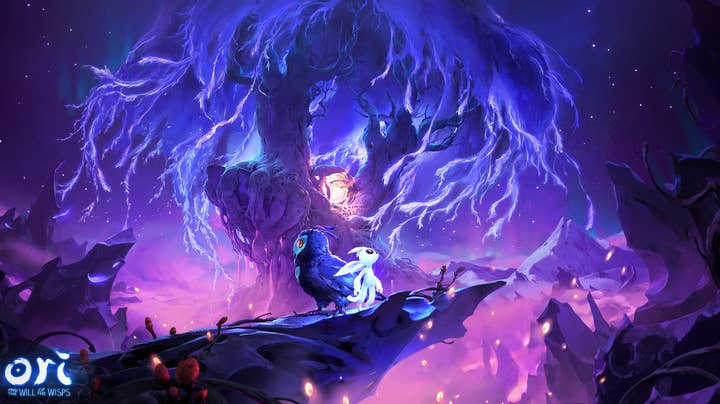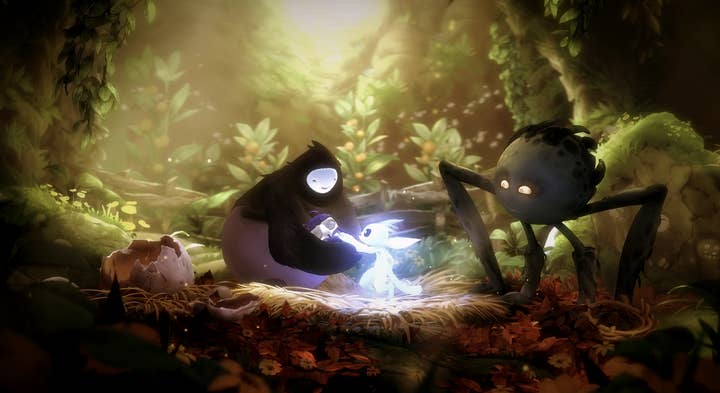Building Ori and the Will of the Wisps with 80 people working from home
Moon Studios' Thomas Mahler reveals the challenges and solutions to managing a distributed development team
When Ori and the Blind Forest launched back in 2015, one of the surprising elements about its production was that everybody worked remotely.
Although not completely unheard of, the idea that this critical darling was crafted by 20 people "working in their pyjamas at home" made for an interesting side story.
"It kind-of happened organically," recalls game director Thomas Mahler.
"When I was working with Blizzard, I was within the cinematics team on Starcraft II. I had the impression that if Blizzard reaches out to a developer, people are immediately going 'Yeah. I want to work for Blizzard. It's a childhood dream'. But the thing that we saw was that when reality kicked in, it isn't that easy to just acquire talent. Really great people who have 10 or 15 years of experience, most likely they're going to have family. They're most likely going to have kids at school. For them, it's not easy to uproot their family and say they're going to do this or that. That's a hard thing to ask someone to do.
"When I was working on StarCraft II, I was finishing up the cinematics on Wings of Liberty. That was an interesting time, because that was when Braid had come out, Castle Crashers had just come out, and Super Meat Boy was about to come out... Limbo was right there. It became very apparent you could make smaller games. I wanted to do that.
"I knew someone from Israel who was a genius programmer, who became the co-founder of the studio. It didn't make sense to make him move to Austria to work with me, which is where I moved to after Blizzard. We had no idea if this was going to come to something. We loved the idea of making some prototypes. We didn't know if it would become a thing. The next person that we hired, who we liked and was talking to, was this programmer from Australia. So we just kept going.
"We hired people away from Blizzard, Riot, Disney and so on... and the pitch was simply: Hey, we have a good salary, but the nice thing is that you can work from home"
"It wasn't something we necessarily planned. But in the end, it became a really successful strategy for us, because we could hire the most talented people out there. We hired people away from Blizzard, from Riot, from Disney and so on... and the pitch that we made was simply: 'Hey, we have a good salary, but the nice thing is that you can work from home'. People didn't have to relocate or uproot their family. Doing that really helped us be able to attract this talent pool.
"The whole goal was to create this elite team. This crazy conglomerate of talent that is spread all across the world, that you'd never get at another studio. It would just be impossible. You have pools of talent like in LA. But even then, you're saying goodbye to all the European talent. The US shot itself in the foot a little bit because of how difficult it is to get a visa, because you might have extremely talented people in Europe who just can't get a work visa. We don't have any of those problems."
Fast forward five years to the sequel, Ori and the Will of the Wisp, and developer Moon Studios is still an entirely distributed game developer. The difference now is that the company now boasts more than 80 members from 43 different countries.

So how does a successful games studio manage an entirely remote team of such a size? Mahler discusses some of the issues and solutions he encountered.
Assign department leads
Moon Studios doesn't operate a traditional hierarchy. Even so, with so many people to manage, having departmental leads was essential.
"It is something a lot of gamers don't realise," he tells us. "It is a huge change from having a company of 20 people where everybody knows what everybody is doing, to a company of 80 people where you don't even know what that person in that department is doing. We definitely had to change things a little bit. We had to introduce... not quite a hierarchy, but we had leads in each department who have a natural talent for organisation and so on.
"We basically told them that they needed to take that lead position and make sure everything is organised, right? We want to make sure everything is clean in our bug tracking tool, and that I can just talk to the leads and get a high level overview of how the art department is doing. That way I don't need to go through 30 people every day. I just need to talk to the leads. That's the sort of thing we do now."
Build a powerful work tool
There are plenty of off-the-shelf tools for communication and work flow, from Trello to Slack. But Moon Studios has developed its own bespoke piece of technology in order to create its titles, and it's an on-going project.
"We built our own tool, which is called Apollo," Mahler details. "Every tool we use, we make it moon-related. It is a really cool suite, where you can put in your user credentials, and get access to a lot of tools and knowledge base, and you can see what everyone is working on, there is a to-do list... all those kind-of things. We just try to make it easy on ourselves. We also regularly use Skype and Teams... the sort-of things we don't have in Apollo yet. The goal is to expand Apollo to feature all of that stuff, so we can keep working in this distributed fashion and have this one tool that does everything."
Bring the team together once a year
Working in a distributed fashion can discourage certain people from engaging in a company's direction or strategy. Equally, disputes and misunderstands can occur between colleagues, particularly if the primary way of engaging with them is via text.
It's one of the reasons why it's important to bring the team together on special occasions.
"Text is a terrible way of talking to people," Mahler says. "You might write something very casually, and somebody else gets super offended. And then you wake up the next morning and you're like 'what the hell? You interpreted it that way?'
"One of the things that we are doing to help with that is to do yearly team retreats. I always wanted Moon to feel more like a band than a company. Where everybody knows each other, everybody is jamming together... so what we started doing really early on is, once a year, we fly everybody to a certain place. We rent a big villa or something. Everybody sleeps there for a week. Everybody gets to bash their heads together and talk about what they would like to do with the company, and how we're doing with the project, and to find out how everybody else is doing. It's a way to do team building and get people to mingle with one another, and just really have a good time.
"I always wanted Moon to feel more like a band than a company. Where everybody knows each other, everybody is jamming together"
"That has been a huge success for us, because every time we have them, people are super motivated and that problem of people getting offended by things that are written down is rectified to a degree because if you know a person, then you probably know he meant something different.
"I am not a native English speaker. I am from Austria and speak German, and a lot of times, I am writing something in a rather harsh way... or at least native English speakers interpret it that way. But I didn't mean anything by it. If you just communicate with text that can happen when people can't get the right tone. The future goal that I would love to see is that we are all sitting there with VR headsets together in a virtual office. That's probably a couple of years down the road."

Anyone can pitch ideas
That yearly retreat can help with pitching ideas. It was during their 2017 retreat (in Barcelona) that the Will of the Wisps story was pitched to the team. Everyone was then invited to speak up.
But this is not just something that can happen during the retreat. Mahler wants ideas and feedback to come from all 80 of his employees.
"We want to have a very open culture where people know that they can just speak up. There is no hierarchy. At Blizzard, there was an incident where I had a design idea for StarCraft II. I just dropped Dustin Browder [lead designer] an email, and was like: "Hey, wouldn't it be cool if this unit just did this?'. I told the rest of the guys on the cinematics team and they were like: 'What? You can't just do that. You can't just talk to the designers like that." That just felt so wrong to me. If somebody has a great idea, I don't give a fuck who it comes from. If it's a great idea, it deserves to be heard.
"The future goal that I would love to see is that we are all sitting there with VR headsets together in a virtual office"
"What we have tried to foster is this idea of... nobody has a boss. Nobody should feel like that this person or that person is above them. Because the talent that we hire is of such a calibre, that I feel small in comparison. I am working with... Tyler, for example, in our 3D modelling team. He's literally guy who modelled Arthas for the Warcraft cinematics. I grew up thinking that I wanted to work on games and cinematics because those models were so amazing. And now the guy who did that is now working for me. So we try to make sure that people can, reasonably, really speak up.
If I am going for some design or something, then I better make sure that I really know what I am talking about, because there might be people who will completely shoot me down. I pay their wages at the end of the day, but that really shouldn't matter. All that should matter is that we're a group of talented people who come together to make the best games out there. That's our goal. Nothing else should be more important than that."
Consider the loneliness
Working completely from home may sound great, but it isn't for everybody.
"[When we hire new people] we kind of get a good sense over whether a person is ready to work in the way that we require them to. Because it can get a bit lonely for those who don't have a family. You're sitting in an office day in and day out, and just talking to people over the internet. That's not for everybody.
"There are certain people who really thrive this way, because they can get a family life, they can see their kids growing up. Even if there is a crazy deadline or something, at the end of the day you're sitting at home. You'll still be there with your wife or husband or kids and so on. But there are some people where it just doesn't work. They might get lonely. We had an amazing animator who I hated to see go, but he couldn't handle it, he felt like the roof was falling on his head. It happens, but it does happen rarely."
